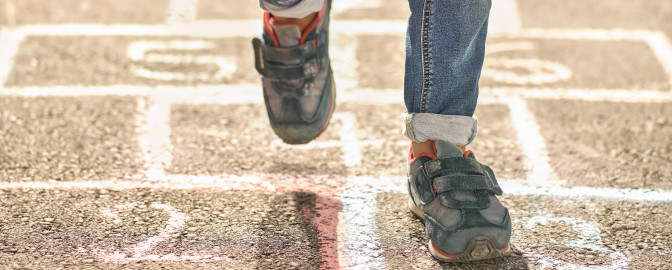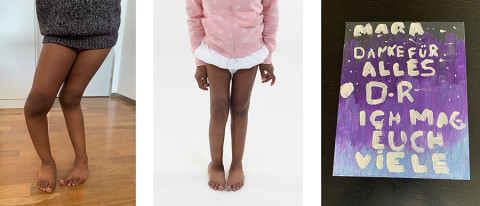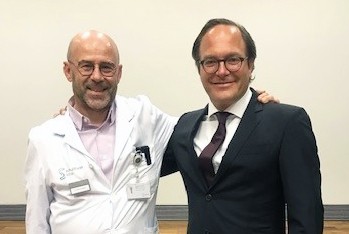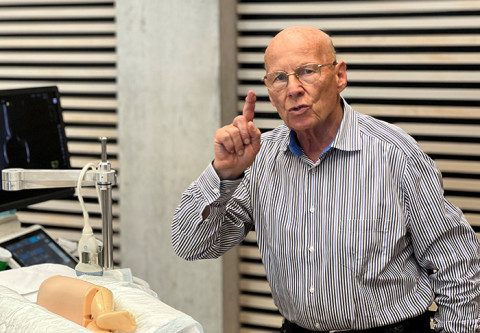Paediatric Orthopaedics
Annual Report 2022

Our specialised Paediatric Orthopaedic team, which now has seven members, has always maintained a very restrained, conservative approach. The top priority is to avoid surgery whenever possible and to help the young patients entrusted to us more with our experience and less with expensive and stressful examinations.
Personal care for the children and their parents is immensely important to us. We attach particular value to consistent anaesthesiological, nursing and physiotherapeutic care. Since Schulthess Klinik has numerous specialist teams all working on site, doctors can consult extremely quickly with experts in the specialist areas that apply to their cases and can coordinate treatment with them.
The treatment of children was even an important part of our founder Wilhelm Schulthess’ work and life’s mission. He treated numerous children with spinal curvatures and conducted research in this field. At the end of the 1960s, about 90% of our patients were children.
In supporting impoverished patients back then, Wilhelm Schulthess was already practising the charitable ethos we uphold today. The Patient Assistance Fund of the Wilhelm Schulthess Foundation still provides support to patients from Switzerland and abroad who are facing complex medical treatment and whose costs can neither be covered by the patient personally nor any other source.
Help for children from war and crisis zones
One focus of our Patient Assistance Fund is the orthopaedic treatment of children from war and crisis zones. To this end, we work closely with the aid organisation “Friedensdorf International”.
Last year, for example, we were able to help 12-year-old Mara from Angola. She had a severe immobilising deformity of the legs that would have made her unable to walk in a few years. In addition to severe torsional and axial malalignments, both of her knee caps were also completely dislocated as part of her syndromal condition. The complex operations to correct Mara’s bone deformities were performed in multiple stages to great success. She is now recovering very well from the operations and receiving intensive physiotherapy. In May 2023, she will fly back to her home country of Angola, where she will have a significantly improved quality of life and finally a future walking around on two straight legs.

Minimally invasive guided growth surgery
If leg deformities (knock knees or bow legs) or leg length differences are so pronounced in children who are still growing that early damage to the joints (especially the knees) or later effects on the spine are to be expected during the course of the child’s life, we can help with simple, minimally invasive guided growth surgery.
For more than 12 years, we have been using a small eight-plate for guided growth, which we attach with one screw above and one below the growth plate to be treated. This is how we slow growth on one side. This allows the axis to be guided during further growth as the opposite side of the joint without the eight-plate continues to grow. Thus, the malposition grows “straight” as the leg continues to grow. In the case of significant leg length discrepancies, we can temporarily or permanently slow one or more growth plates on the longer side.
In 2022, we performed 252 such operations. The impact of this kind of guided growth is tremendous, as imminent joint wear can be prevented effectively with very little effort. The limitations after the operation are minimal for the patients, who are mostly adolescents. The patient will have to avoid exercise for two to a maximum of four weeks.

Change of staff in Paediatric Orthopaedics

Dr. med. univ. Hannes Manner took over as the new Head of Paediatric Orthopaedics in July 2022. Since 2006, he has served as a senior consultant and from 2020 as Deputy Head of the department. In recent years, he has taken on increasing responsibility for organisational tasks in Paediatric Orthopaedics. We are pleased to have found in him a competent successor to Dr. med. Rafael Velasco.
Dr. med. Rafael Velasco will continue to support the clinic as a senior consultant. We sincerely thank him for his tireless efforts in growing our prestigious department over the last 20 years.
Sharing and exchanging knowledge
We have a long history of sharing our expertise and exchanging ideas with colleagues.
In keeping with this tradition, we again held the training on “Paediatric Orthopaedics for Practice” in 2022. We have been putting on this training with “Kinderärzte Schweiz”, the professional association for paediatricians in Switzerland, for over 10 years. It gives paediatricians the opportunity to receive further training on paediatric orthopaedic issues relevant to their daily practice and learn crucial orthopaedic examination techniques. This year’s course focused on the knee in children.

The diagnosis and treatment of hip dysplasia and hip luxation in newborns were the topics of the “Advanced and Refresher Course on DDH and Infant Hip Ultrasonography”. Univ. Prof. Prim. Dr. med. Reinhard Graf, who developed the hip ultrasound procedure almost 30 years ago, together with Dr Beat Dubs, Medical Director of the Glattpark Sonography Institute, and the specialists from our Paediatric Orthopaedics department, shared valuable expertise with the participants in lectures, case discussions and practical exercises.

